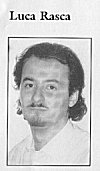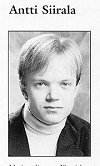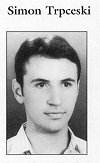Grand Prize Antti Siirala
Second Prize Simon Trpceski
Third Prize Luca Rasca
This result was controversial and further reports about the finalists from the S&H team of observers follow.
The London World Piano Competition 2000 reconsidered
This competition had what must have been an exciting, surprise finish on 29 April, with an outsider coming up from behind to win at the tape. Several reviewers from the S&H team (none of whom had heard the eventual victor in earlier stages) were present for the 'Grand Final' and their reports are published below.
Their disagreements probably reflect those of the jurors, whose criteria and marking systems remain secret. Wen-Yu Shen, the tiny little 13 yr. old Chinese boy who had entranced me in his semi-final recital, joined the prizewinners on the platform to receive one of the educational scholarship awards for younger participants who show outstanding potential. People present were incredulous that he had been prepared to play Rachmaninoff No 3.
Theo Wohlfart, an experienced international piano competition watcher, gives the benefit of his experience in putting the London competition in perspective. He told me that most other major competitions (including Leeds and the London String Quartet Competition recently reviewed by S&H) have an audience prize in addition to those awarded by the Jury - this reflects the fact that the ultimate fate of a musician's career depends upon the public as well as the experts. By all accounts, that would have revealed yet another preference on this occasion!
Peter Grahame Woolf
The last pianist to be heard in the semi-finals, the Italian Luca Rasca, provided an imaginitive programme which contrasted two Ligeti Etudes with Chopin's Op. 10 set, before progressing to the heady world of Ravel's Valses Nobles et Sentimentales. Whilst Ligeti's Fourth Etude could have benefited from that final ounce of fantasy, he viewed Chopin's Op. 10 as a whole, the final C minor (the 'Revolutionary') seeming an inevitable and exciting conclusion. His sensitivity was most in evidence in his idiomatically-coloured Ravel. He plays with both controlled power and sensitivity, a (if you'll pardon the pun) winning combination, and I look forward very much to his Brahms first on Saturday.
Colin Clarke
World Piano Competition: Grand Final, RFH 29 April 2000
The World Piano Competition reached its climax on Saturday evening with the concerto final. The three pianists who had been selected were the Italian Luca Rasca, the Macedonian Simon Trpceski and the Scottish Martin Cousin, who on the night was too ill to play. He was replaced by another semi-finalist, the Finnish pianist Antti Siirala, who won! That the jury made the wrong decision in choosing their eventual winner is now history.
With two Brahms' Firsts and a Prokofiev Third, it turned out to be an evening that mixed stunning virtuosity with some profoundly poetic playing. Luca Rasca, the oldest of the finalists, began with Brahms' titanic D minor concerto. The first entry of the piano was imperceptibly achieved, and he played the vast first movement with an aristocratic poise that was almost Pollini-esque in its conception. The playing was often statuesque, with the struggle between the torrential chords and more lyrical phrasing subtly drawn. The weaving together of the F major solo subject was accomplished with refinement and intimacy. The second movement was poetic and raptly meditative. If he lost concentration in the Rondo, it did not seriously impair his interpretation. The final allegro lost some of the fluency he had built up during the first two movements, but this remained a very empathetic performance. Perhaps the tensions between the orchestra and soloist were not as dramatic as they should have been in this most symphonic of concertos, but I was happy to have heard a performance which was intensely musical. One of Rasca's teachers was Lazar Berman, a noted interpreter of this concerto. On paper at least, this gave Rasca a cruel advantage over the Finnish pianist.
Antti Siirala's Brahms First appeared after the interval - a very different performance. Compared with the tall, elegant Rasca, Siirala is short and slight, yet the sounds he achieved from the Steinway were staggering. His was clearly a virtuosic performance, with speeds precariously close to becoming disastrous. Siirala's wrong notes were scattered liberally, but I was more concerned about the lack of interaction with Brahms' lyricism - a problem which seriously undermined this performance. Orchestra and soloist fired sparks off each other, but is Brahms' D minor really as war-torn as Siirala perceives it? This was Blitzkrieg stuff, the chords thrown off with great panache, the thunder more tropical than European. If he had one advantage over Rasca it was what he did with his fingers before touching the keyboard. Rasca's hovered nervously above the ivory, but Siirala's just touched the keys at the right moment. His feet banged the floor, Rasca's remained firmly rooted. His was by far the more interactive performance, but it seriously lacked the poetry and lyricism that are also part of this concerto.
Simon Trpceski opted for Prokofiev's virtuoso war-horse. As an example of pure pianism it was by far the most thrillingly (and accurately) played concerto of the evening. The overhand playing that figures so prominently in both the first and last movements was cast off with superb precision, and the harmonics played on the upper registers of the keyboard were sprung from transcendental articulation. He could stroke the keyboard like a cat, or he could race his fingers across the span of the keyboard like a demon. Of all of the pianists his technique seems the most complete. But there is more to this concerto than blatant virtuosity, and I was pleased that Trpceski saw this. Where Prokofiev's writing is spiky, this is precisely the effect he achieves. In the second movement, he produced playing of a ghostly, almost cantabile beauty in the andantino variation, with Trpceski masquerading as lover and acrobat convincingly. The more gymnastic passages were hair-raising. Like Siirala's Brahms, this was an interactive performance. When Trpceski was playing the sense of drama was always apparent, and he kept this up in the orchestral passages by almost conducting the players from the keyboard. His sense of involvement was undeniable. His ovation suggested he was the audience choice.As it was, Rasca's apparent advantage in having Berman as a teacher proved misplaced. Siirala duly won first prize for his Brahms D minor, a somewhat shocked Rasca taking the third. The popular Trpceski, to sighs from the audience, took second. I can now look back on Siirala's Brahms as more imaginative than my initial impression of his performance suggested but, for his sheer musicianship, Rasca should have won. I suspect, however, we will be hearing more of all of these pianists, particularly the exciting Trpceski who promises much for the future.
Marc Bridle
The so called Grand Final of the fourth triennial World Piano Competition, London, took place at the Royal Festival Hall on South Bank. What a pretentious title, implying thereby that London is the centre of the world, which it certainly is not, not even with regard to piano competitions!
Established in 1991 by the Russian piano teacher Sulamita Aronovsky, to give the British capital city its own piano competition, this event, still in its infancy, has to be compared with Leeds, or the former Carl Flesch Violin Competition, which sadly died quite some years ago and has not been revived yet, despite lots of efforts. Contrary to all major competitions, where six finalists compete for the first prize (allowing for occasional withdrawals) only three out of nine semi-finalists take part in the final of this one. All competitors have to prepare two concertos out of 21 listed in the competition repertoire. If they reach the final, the jury will decide which concerto they will have to play.
On Saturday, something quite astonishing happened. Lady Solti, who hosted the final in the presence of the competition's Patron, HRH The Prince of Wales, introduced the finalists Luca Rasca (Italy) Simon Trpceski (Macedonia) and Martin Cousin (Scotland), only to announce further that Martin Cousin had withdrawn due to illness and that 'a replacement had been found' in Antti Siirala (Finland). Did that mean the pianist who, in the opinion of the distinguished jury, had come fourth? Let us hope this was the case.
The jury consisted of ten eminent international pianists and teachers, as well as the Chairman, Sulamita Aronovsky, who has the casting vote. (Normally in major competitions there is an odd number of jurors, and the chairman should always be non-voting!) It was certainly interesting to ponder how the jury might judge a competitor whom they had not chosen for the final? In theory, he could of course win, but that would show the jury's own vulnerability. In practice, this turned out to be the case and one has to thank the jury that they were able to overcome their own nature.
This year, I could not find the time to follow all competitors through the different stages. Therefore, I was unbiased and not able to form my own opinion beforehand. Of the three finalists, only Antti Siirala, still 20, who played the Brahms Concerto No.1 in D minor, op 15 after the interval, left a lasting impression. We had already heard it played under less favourable circumstances by the Italian Luca Rasca.
Siirala took risks to the extreme, but in contrast to his fellow finalists, made me listen. He played Brahms in grand manner realising right from the beginning, realising that his interpretation had to counterbalance a conductor (the Russian Alexander Vedernikov) who seemed to be more interested in showing off himself. The London Philharmonic, playing the work for a second time, was far more assured without the previous balance problems. This pianist I want to hear again. He is a full-blooded musician with a fascinating sense for the quality of the sound, be it the purest pp in the second movement or an extreme ff, where necessary, but never for its own sake and always with the outmost transparency. In the last movement his tempi were maybe a little bit too brisk - he gave the impression of a horse that wants to get home quick and safe. But he never showed any of the many negative attitudes pianists like to display nowadays; his quiet body posture did not show any wrong tension nor did his ego take over. He played Brahms with a passion and urgency I had not heard for quite some time.
Luca Raska (28) from Italy, who came third, could not convince me at all. His playing sounded distant; he produced a beautiful, but empty tone, always close to kitsch, and never quite managed to get the essence of this great piece right. The second prize went to Simon Trpceski (20) from Macedonian, an incredible technician, who overwhelmed the audience with Prokofiev's 3rd concerto, a technical bravura piece, but interpreted without the necessary flair and personality. Vedernikov´s overpowering accompaniment led to a heavy struggle between soloist and orchestra, quite often in favour of the orchestra. Only very few pianists are able to let you forget the technical demands of this concerto and make you listen to its powerful beauty.
Finally one personal thought: what are the distinguished jurors really looking for, when two of the original finalists are either introvert or raping their body, the piano and the composer, instead of being devoted to the music, while somebody not even chosen as a finalist proves to be an outstanding musician? I am sure Antti Siirala will develop even further and I wish him lots of good luck - he deserves to be taken seriously as he makes one listen and discover.
Hans-Theodor Wohlfahrt



 Return to:
Return to: